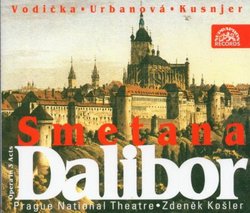| All Artists: Vodicka, Urbanova, Kusnjer, Marko Title: Smetana Dalibor-Opera in 3acts Members Wishing: 0 Total Copies: 0 Label: Supraphon Release Date: 6/30/2009 Album Type: Import Genre: Classical Style: Opera & Classical Vocal Number of Discs: 2 SwapaCD Credits: 2 UPC: 099925007720 |
Search - Vodicka, Urbanova, Kusnjer :: Smetana Dalibor-Opera in 3acts
 | Vodicka, Urbanova, Kusnjer Smetana Dalibor-Opera in 3acts Genre: Classical
|
Larger Image |
CD DetailsSimilar CDs
|
CD ReviewsAstounding nobel and tragic masterpiece Pater Ecstaticus | Norway | 09/29/2005 (5 out of 5 stars) "One could call this opera the the 'Bohemian Fidelio'. But where Fidelio ends in triumph, this opera ends with the (maybe inevitable) demise of the hero. And what a hero we have here! From the very moment our proud and determined hero enters the (sound)stage (Act I, Scene 4: 'Jaky to zjev!' 'Ah what a sight!'), accompanied by the noblest of marches, we are impressed with his presence which is to dominate and give a melancholic beauty and nobel strength to the whole opera for the rest of its duration. This is a very melancholic hero: knight Dalibor (like Florestan), fighting against injustice and the vainglory of the burgrave of Ploskovice, ultimately loses his best friend, Zdenek, in the fight: Zdenek is captured by the burgrave's guards and subsequently decapitated - his head put on a spike for everyone to see. In revenge, Dalibor kills the vain burgrave who has murdered his best friend. The burgrave's sister, Milada, at first is in shock about the death of her brother and wants revenge. But, learning about both sides of the story and the sincere and honest motives of Dalibor, is beginning to respect and ultimately love Dalibor.
Since the beginning of the opera, the spectre of Zdenek hunts Dalibor - truly magnificently invocated by Smetana by a sweet and beautiful melody for solo violin whenever Dalibor is talking about his friend or when he is sent into transports of ecstacy thinking or dreaming about him, namely in the dungeon where he ends up halfway through the opera. Dalibor is judged by the royal court and ultimately sentenced to death by the king, who of course cannot ignore this act of treason against the crown. But before this can happen, Dalibor is freed by the help of Milada and the (albeit unknowing) jailor (spectres of Fidelio!). A fight ensues in which firstly Milada, in an act of highest love and sacrifice, is killed. Now Dalibor, poclaiming his wish to join his beloved Zdenek and Milada in heaven fights and is killed as well... Full of memorable melodies, this opera goes from one strength to another throughout its whole length. The whole work - the music as such, but especially this magnificent performance here by the Prague National Theatre Orchestra led by Zdenek Kosler - glistens with pride for the music and culture of Czechia. Also, many of the singers have a specific Central-European timbre to their voices that is nicely approprate, although some may dislike the wobbly and constricted-sounding singing of Jirina Markova (who sings the role of Jitka). But the voices of Leo Marian Vodicka (Dalibor) and Eva Urbanova (Milada) are powerful and clear, projecting much nobility and strength into their characters. But special praise must go to the orchestra and the conductor for playing this beauteous music with so much love, clarity and nobility. I must confess I have never heard any other recordings of this (somewhat unknown and often downgraded) masterpiece, but I am afraid to do so for fear of losing the love I have for this performance, which holds one's attention from beginning to end. This recording IMHO is a resounding succes for all those involved!" |

 Track Listings (19) - Disc #1
Track Listings (19) - Disc #1
